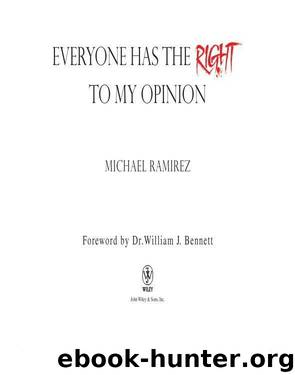Everyone Has the Right to My Opinion by Ramirez Michael Bennett William J. & Bennett William J

Author:Ramirez, Michael, Bennett, William J. & Bennett, William J.
Language: eng
Format: epub
Publisher: John Wiley & Sons, Inc.
Published: 2010-12-16T16:00:00+00:00
INTRODUCTION
It’s a calm morning; a rectangle of light shimmers from the dawn through the window and across my drawing board. The newspapers have been read, the blogs scanned, and the television is reverberating with the latest news. It’s an election year and the rhetorical winds of change are blowing again, and my pen is poised and ready to attack. And I’m stuck here writing an Introduction to my book instead of leaping into the political fray.
I’m an editorial cartoonist. I’m not a writer. If I could write I would be a columnist.
My publisher wanted me to recount stories like the time I won my first Pulitzer Prize and I was greeted at the awards ceremony at Columbia University by an enormous protest. Several protestors approached our car. I realized they had no idea what I looked like when they handed me a flyer protesting myself. So I joined the picket line. I may be the only Pulitzer Prize winner who has protested himself.
Or the time I was investigated by the Secret Service over one of my cartoons.
Or the time I was in Havana interviewing the Minister of Information. He refused to answer questions about imprisoned journalists, censorship, the Brothers in Arms flight that was shot down in international airspace, or the tugboat full of Cuban refugees that was capsized outside of Havana Harbor, drowning most of its occupants.
I brought up the elaborate political process Cuban journalists had to go through to get into print. I brought up the fact Cuban editorial cartoonists could not draw cartoons of Fidel or Che Guevara. I told him that in the United States we believe a country that cannot make fun of its leaders is usually a country imprisoned by its leaders. I asked him one last question, the camera zooming in on his face: “What is your favorite Fidel Castro joke?” His face went ashen. He was speechless. And I got my answer.
It was the same answer William M. Tweed and Tammany Hall gave 120 years earlier in reaction to Thomas Nast’s cartoons. Boss Tweed was a little more vociferous in his condemnation, “Stop them damn pictures. I don’t care so much what the papers say about me. My constituents don’t know how to read, but they can’t help seeing them damned pictures!” It was clear the Castro regime recognized the power of the pen.
Confucius believed only the virtuous should exercise power. Aristotle argued that only by participating in politics can one truly live an ethical life. Machiavelli altered that thinking. He believed the stable state was more important than virtue. John Locke believed that man had certain “natural rights.” Rousseau believed man was free but subject to volonté générale or the general will. But what defines the general will? And what instrument of governance would determine the general will?
In the Declaration of Independence Thomas Jefferson wrote, “We hold these truths to be self-evident, that all men are created equal, that they are endowed by their Creator with certain unalienable Rights, that among these are Life, Liberty and the pursuit of Happiness.
Download
This site does not store any files on its server. We only index and link to content provided by other sites. Please contact the content providers to delete copyright contents if any and email us, we'll remove relevant links or contents immediately.
Spell It Out by David Crystal(36110)
Professional Troublemaker by Luvvie Ajayi Jones(29651)
The Secret History by Donna Tartt(19053)
We're Going to Need More Wine by Gabrielle Union(19034)
Cat's cradle by Kurt Vonnegut(15338)
The Goal (Off-Campus #4) by Elle Kennedy(13657)
The Social Justice Warrior Handbook by Lisa De Pasquale(12187)
The Break by Marian Keyes(9358)
Crazy Rich Asians by Kevin Kwan(9279)
The remains of the day by Kazuo Ishiguro(8979)
Thirteen Reasons Why by Jay Asher(8894)
Educated by Tara Westover(8047)
The handmaid's tale by Margaret Atwood(7757)
Giovanni's Room by James Baldwin(7330)
Win Bigly by Scott Adams(7184)
This Is How You Lose Her by Junot Diaz(6877)
The Rosie Project by Graeme Simsion(6381)
Six Wakes by Mur Lafferty(6241)
The Power of Now: A Guide to Spiritual Enlightenment by Eckhart Tolle(5760)
